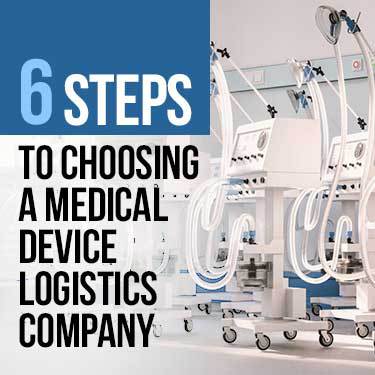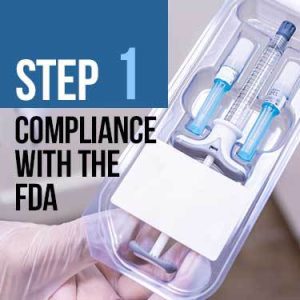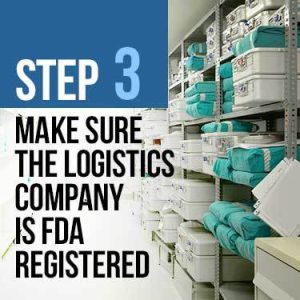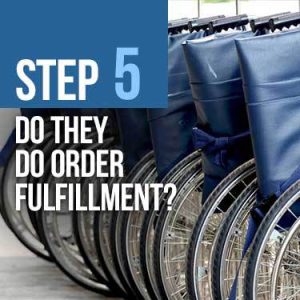
 Copy URL to Clipboard
Copy URL to Clipboard
Providing devices for hospitals, doctor’s offices and everything in between isn’t like selling many other types of products. There are quite a few things you must be cognizant of, like how to store the devices and making sure both the devices and how they are handled are in accordance with the Food and Drug Administration’s (FDA) regulations. In this regard, choosing correctly between many different medical device logistics companies is of the utmost importance and shouldn’t be taken lightly. So you might be in a bit of a bind trying to figure out the correct steps to go about this.
Choosing a medical device logistics company should involve the following steps:
In our comprehensive guide below, we take a close look at each step giving you a complete look at exactly what needs to be done to find the right medical device logistics company.
Table of Contents

It’s hard to “rank” the steps in choosing a logistics company to handle your medical devices, but it is easy to immediately cross the company off the list if they aren’t in compliance with the regulations and best practices set forth by the FDA on handling the items.
First off, let’s talk about what constitutes a medical device. One might immediately think of complex technology like MRI or x-ray machines but in truth, a medical device as defined by the FDA can be things as simple as tongue depressors or ubiquitous tools like blood glucose readers. These products are much needed by the healthcare industry and healthcare system, so it is necessary that the various medical devices are readily available.
There is actually a section — 201(h) of the Food, Drug & Cosmetic Act — that covers what the FDA defines as a medical device. To summarize, there are three determining factors that can lead to your item being classified as a medical device:
Once you’ve been able to decide if your product is a medical device based on the above criteria, then you can check the FDA Product Classification Database to check if the devices you plan on making available are in a classification that already exists. While looking to make this call, there are a few things you can do:
One thing to note is that software, whether in the form of a computer program or mobile application can be considered a medical device. This gets its own designation of Software as a Medical Device (SaMD).
Once you’re certain that you have qualifying medical devices that are in regulatory compliance with the FDA, the next step is to find the ideal place to store your products until the time they have to make it to the end user.
This in itself is a step toward finding the right logistics company to partner with for your medical devices, so it should definitely be taken seriously. The first step, if feasible, would be to personally walk any warehouse that you’d consider having your products shipped to in order to be stored. Since medical devices can range wildly in price, you’d want to make sure your items are being taken care of properly. If touring the warehouse is unfeasible for any reason, then do your own research on the matter. With the prevalence of the internet, you’ll surely be able to read reviews of logistics companies to get some kind of feel for them.
For medical devices, especially any with electronic components, you want them stored in a clean, climate-controlled warehouse. While the medical devices shouldn’t be perishable, they should be kept in the best possible conditions regardless. Besides that, the warehouse (to the best of your knowledge) should be logically set up to maximize efficiencies and to safeguard the integrity of your medical devices.
Also, many warehouses have a Warehouse Management System (WMS) that keeps track of where and how much of the devices are in the building. These are helpful because the logistics company can share that information with you, mostly the quantity, so you can more accurately have orders filled and know when to send more medical devices to the warehouse.
Another important aspect of a warehouse is its location. Let’s say your company operates out of Seattle but you do a large amount of business in New York City. The warehousing you’re offered should be in close proximity to where the product needs to end up, or in a good centralized location if it will be distributed to many points across the United States easily.
So in summary, look for a temperature controlled warehousing solution in a location that works for your business.

You could make a strong argument that this should happen before or during the process of looking over the warehouse but we are putting it next because if you don’t like where the warehouses are located or how they appear to be run, then you won’t care about this step.
But this is extremely important in many regards because the only way a logistics company will be FDA registered is by being in compliance in all the areas required. The condition of the warehouse (as mentioned above) needs to be safe and clean if it is to be registered with the FDA. This means free of any pests such as rodents or insects.
While this next requirement could be more for perishable goods, it is still nice to have even for your medical devices. That is a labeling system which is clear and accurate. Some of the things that are needed on the labels are any expiration dates, requirements for temperature or batch numbers. Specifically for medical devices, the labels provide a clear view of the chain of custody, which is a must for the FDA. Another thing that is similar to labeling requirements is lot control systems.
These systems are put in place so that items throughout a warehouse are stored together properly and in an orderly enough way that they can be easily accessed at a moment’s notice. The system is put in place to separate goods from different batches or brands from one another. The lot control system would also be helpful in lowering costs if any recalls were to occur.
Any FDA warehouse must go through regular inspections, maintain prevention plans for accidents or other emergencies, and also handle product recalls. The building in many cases should be properly secured, meaning not just anyone can walk in and out of it, and have access to your medical devices.
This is specific to exactly what you’ll be storing and any warehouse that provides fulfillment services for medical devices. But the FDA registered logistics company you decided on should be able to accommodate both Class I and Class II medical devices. The main reason the FDA ranks medical devices into classes is to denote the level of risk to both the patient and the healthcare professional using them.
You want to make sure that Class I and II can be handled and that the logistics company can also deal with the extra labeling needed by Class II medical devices.
So you’ve confirmed that the third-party logistics (3PL) can handle properly storing and handling your medical devices, and is also certified by the FDA. But what is the plan for getting your items from their warehouses to the actual customers? Healthcare logistics can differ slightly from normal logistics but there are some basic things your 3PL company should be able to offer you in the form of logistics solutions.
First is readily available trucks to deliver your products to anywhere in America. Those 18-wheelers should be able to be ready when you need them to transport your medical devices where they need to go. If for some reason an 18-wheeler won’t work, a completely covered 3PL can provide vans for smaller or more secure shipments, or even have partnerships that allow for the use of ocean, rail or air freight shipping as an option for times when that will work the best.
Besides the ability to simply put stuff on the road, sea or into the air, you should also be looking at their stated on-time arrival rates or incident reports (if those numbers are available). This can show you that the transportation for your medical devices is not only prevalent, but that if you agree to have the 3PL in question shipping your products, that they’ll get there on time and have everything in perfect shape. No matter what happens, you should be comfortable with the transportation services provided.
While it might be hard to obtain some of this information, it’s also good to make sure the 3PL you’re looking at has financial might and is in good shape in that regard. Depending on your needs, domestic transportation might be enough but it also might be nice if they have a global network in place should you ever require that kind of reach.
One of the services your business might need is cross docking. A cross docking facility enables your medical devices to quickly be transferred from one truck to another without the need for short term storage in most cases. R+L Global Logistics offers cross docking services through multiple facilities across the U.S.

While the medical device logistic company you’re looking at might store it and ship it on your behalf, it’s fair to wonder if they will also fulfill orders at your behest. Order fulfillment is the process in which the 3PL has your medical devices stored in their warehouses and then packages or otherwise transports your items to the end user after receiving the order from you. This is a very prominent step in the list of supply chain solutions since it makes a lot of sense that if you’re using the warehouse storage of a 3PL — in most cases — you wouldn’t want the stuff sent back to you so you could ship it yourself.
Just like the steps before though, it’s not going to be good enough for them to throw your stuff into a box or leave it packaged generically if presentation is at all important to you. So you need to figure out if they can fulfill the orders in a way that portrays your business in the best way. If you have a company do your warehousing, order fulfillment and shipping, you must realize your medical device products are out of your hands and you must have a business partner you implicitly trust since the next time you might hear anything about it is from the customer after it’s been received.
If you’ve determined that the medical device logistics company offers the warehouse fulfillment services that meet your needs, then you can move onto the next step.
Whether it’s medical devices or any kind of products, a manufacturer or wholesaler can’t escape the inevitable: having to deal with returns. This can be handled one of two ways — you can have the customer ship the item directly back to you, or you can have the 3PL company who originally fulfilled the order also deal with returns — otherwise known as reverse logistics.
An outstanding medical devices logistic company can actually offer customized solutions for you, so that returns are processed the way you want them to be. There are different options that each have their own benefits:
You can have the 3PL do everything: If you’ve trusted them with everything up to this point and don’t want additional headaches on your plate, this can be a great option. Under your instructions, the 3PL can ship back out a new product to the original customer while then disposing of, recycling or salvaging usable parts or materials. Having the items disposed of or recycled prevents them from being re-routed to you and the salvaging of resources from a non-functioning medical device can be both cost-efficient and environmentally responsible.
You can instruct the 3PL to accept returns and then ship them back to you: If you want to be more hands-on with how returns or dealt with, or want to make sure the recycling/salvaging process is done the exact way you want it, you could have them shipped to the 3PL for initial intake, they can separate it into one of the the three categories, throw away the garbage and send the rest back to you so you can determine what is able to be recovered.
You can have the 3PL company not engage in reverse logistics: If you want total control, then have any customers who have problems with their medical devices send them directly back to you. If they need a replacement product immediately, you can have the 3PL fulfill that but you deal with the actual broken or non-functioning products yourself.
Now that you’ve seen what medical device logistics companies do and the steps needed to pick the right one, hopefully it’s become evident that you should pick up the phone and call R+L Global Logistics right away. Experts in the business, R+L Global Logistics is the best company to handle the logistics of shipping your medical devices.
R+L Global Logistics truly has everything you need to support your business throughout the entire supply chain. As an FDA-registered provider, we can store your medical devices in a warehouse in a location near where you need it. Also, we know that some medical devices need to be kept free of heat, humidity or moisture, so R+L Global Logistics offers climate-controlled storage as well.
From there, R+L Global Logistics can also engage in order fulfillment on your behalf. This can be in the form of pick and pack fulfillment for smaller medical devices or placed on the back of an 18-wheeler or dry van and shipped right to the customer by us for you.
We also handle other aspects of the supply chain such as reverse logistics (returns), cross docking transload and general 3PL warehouse services. Also included in any service we provide for you is our outstanding knowledge, work ethic and industry-leading customer service.
So when you’re ready to explore which medical device logistics companies offer the best overall value, look no further than R+L Global Logistics. Give us a call at 866.989.3082 today for a free quote.
